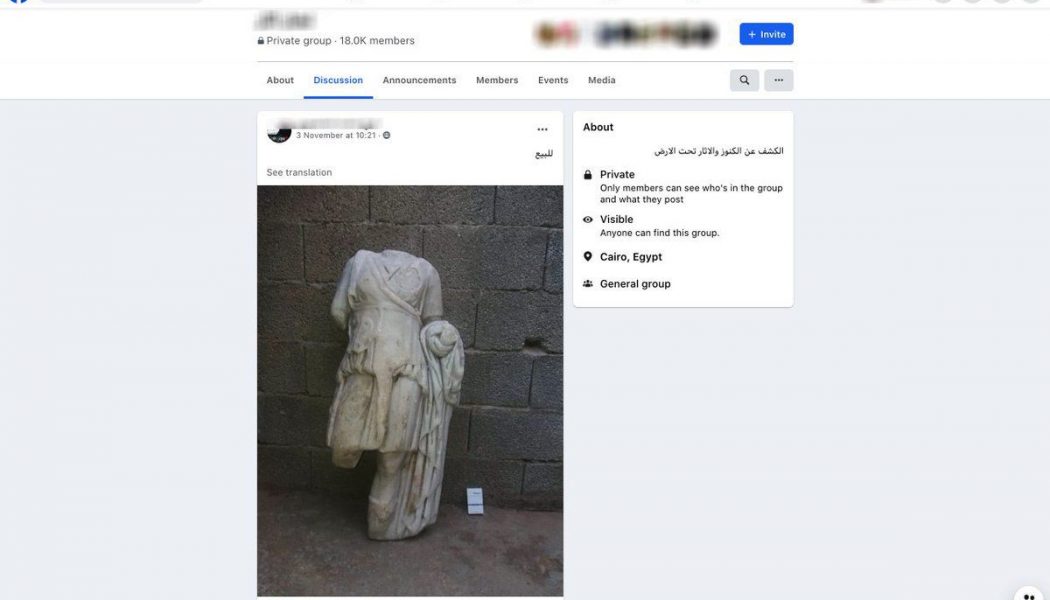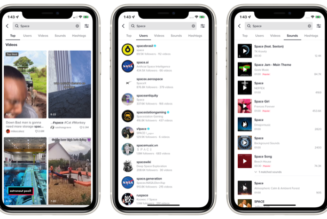On October 24th, 2020, an art trafficker in Darnah, Libya posted a series of unusual ads. For sale: a Greco-Roman statue, its marble bust covered in a toga. If it looked like it belonged in a museum, that’s because it did. The seller posted photos of the piece in private Facebook groups dedicated to trafficking antiques.
The black market for looted goods is flourishing on Facebook. While the company banned the sale of historical artifacts in June, many of the posts are in Arabic, and Facebook lacks the expertise to properly enforce its new policy.
:no_upscale()/cdn.vox-cdn.com/uploads/chorus_asset/file/22121780/EnEdmG3W8AUq8VG.jpg)
When Facebook is able to identify groups that flout its guidelines, experts say the company simply deletes them, expunging crucial documentation for researchers studying stolen art. “This is critical evidence for repatriation efforts and war crimes,” says Katie Paul, co-director of the Athar Project. “Facebook has created a problem and rather than turning that into something they could contribute to, they are making it worse.”
The implications go far beyond art theft. Since 2014, looted antiques have been a major funding source for terrorist organizations like ISIS. The Middle East is rich with cultural artifacts, and the market for stolen goods isn’t as regulated as drug trafficking and arms sales.
The seller of the Greco-Roman statue posted the ad in Facebook groups which had between 5,000 to 18,000 members. There, traffickers live stream their looting activities, giving each other tips on digging and finding buyers for pieces that are still in the ground. Athar is currently monitoring 130 groups dedicated to trafficking antiques.
A group in Syria with 340,000 members has posts showing looters uncovering a mosaic. In the comments, Athar documented one user saying the mosaic shouldn’t be removed, while another responded with laughing emojis saying: “Die of hunger for the history of the country.”
:no_upscale()/cdn.vox-cdn.com/uploads/chorus_asset/file/22121782/Enrj6cZW4AI_qEw.jpg)
The problem is particularly grave in active conflict zones where trafficking antiquities is a war crime. “It’s infuriating and problematic,” says Samuel Hardy, a research fellow at the Norwegian Institute in Rome who specializes in cultural heritage and conflict. “When Facebook pulls evidence that people are self-publishing, we lose not only the ability to track the cultural property and return it to the victimized community, but also any hope of identifying and stopping the criminals who are making money from it.”
Facebook isn’t the only platform struggling with how to police content while preserving evidence for research groups like Athar. YouTube has also received criticism for removing extremist content that researchers are trying to study. While both companies will sometimes preserve evidence at the request of law enforcement, this policy doesn’t help most academic researchers.
“We’re not saying that all this content has to remain public forever,” Jeff Deutch, a researcher at the Syrian Archive, told Time, in relation to videos documenting human rights violations. “But it’s important that this content is archived, so it’s accessible to researchers, to human rights groups, to academics, to lawyers, for use in some kind of legal accountability.”
On Facebook, the issue has existed for years. Those trying to study the company’s ad targeting tools have also been frustrated by its unwillingness to share data with academics.
In the case of art traffickers, Facebook’s pivot to privacy has had unintentional benefits, since criminals use secret groups and encrypted messages to conduct illicit activity. “This in turn has made Facebook the wild west of social media, providing opportunities for violent extremist organizations and criminal groups to operate in plain sight with little recourse,” Athar wrote in a report.
Facebook would not comment on the record for this story.










